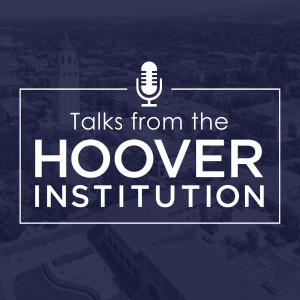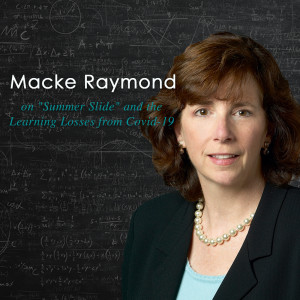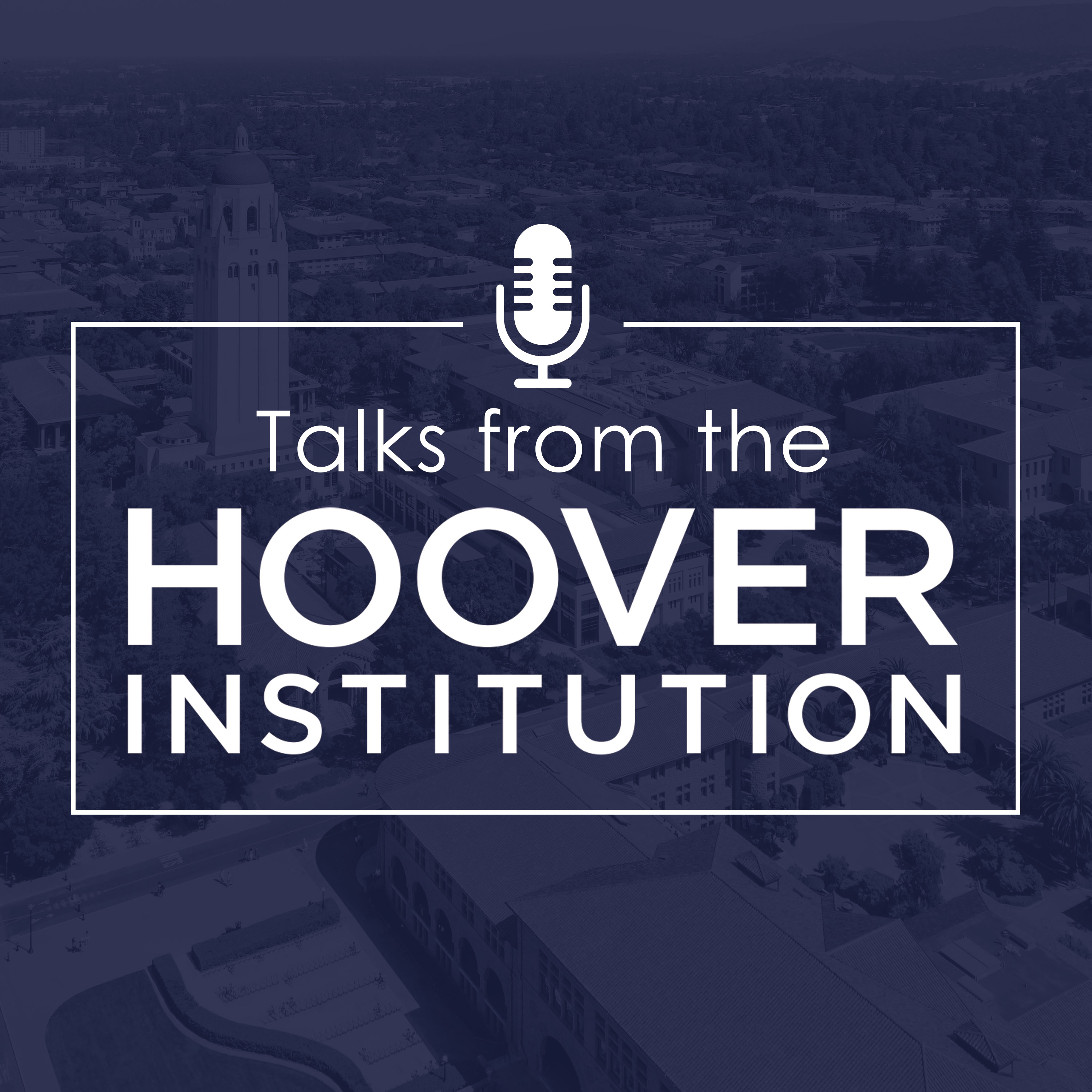Episodes

Wednesday Mar 31, 2021
Executive Power Under The U.S. Constitution
Wednesday Mar 31, 2021
Wednesday Mar 31, 2021
Wednesday, March 31, 2021
Hoover Institution, Stanford University
Senator Mike Lee in conversation with Michael McConnell on Wednesday, March 31, 2021 at 3:00 PM ET.
ABOUT THE SPEAKERS
Senator Mike Lee was elected in 2010 as Utah's 16th Senator. He has spent his career defending the basic liberties of all Americans and advocating for our founding constitutional principles.
Senator Lee acquired a deep respect for the Constitution early in life while watching his father, Rex Lee, serve as the Solicitor General under President Ronald Reagan. He attended most of his father's arguments before the U.S. Supreme Court, giving him a unique understanding of government up close.
Lee graduated from Brigham Young University Law School in 1997 and went on to serve as law clerk to Judge Dee Benson of the U.S. District Court for the District of Utah, and then with future Supreme Court Justice Judge Samuel A. Alito, Jr. on the U.S. Court of Appeals for the Third Circuit.
Michael McConnell is a Senior Fellow at the Hoover Institution and the Richard and Frances Mallery Professor of Law and the director of the Constitutional Law Center at Stanford Law School.
During his many years of government service, McConnell served as a circuit judge on the US Court of Appeals for the Tenth Circuit and as an assistant to Solicitor General Rex Lee at the Department of Justice.
Over his career he has argued fifteen cases in the U.S Supreme Court. His teaching focuses on constitutional law, constitutional history, the First Amendment, and interpretive theory. His most recent book is The President Who Would Not Be King: Executive Power under the Constitution published in November 2020; his next book will be released in 2021 the Establishment of Religion: Neutrality, Accommodation, and Separation.
For more information go to: https://www.hoover.org/publications/capital-conversations

Friday Mar 26, 2021
Cyberspace and Strategy: Deterrence, Escalation, and the New Administration
Friday Mar 26, 2021
Friday Mar 26, 2021
Friday, March 26, 2021
The Hoover Institution hosts A Decade Of US Cyber Strategy: A Hoover Chat Series With Cyber Experts And Defense Leaders on January 29, February 12, February 26, March 12, March 19, and March 26, 2020.
The March 26 session focuses on how deterrence and escalation factor into US cyber strategy and have shaped the evolution of US cyber strategy with a concluding look to the future and cyber strategy under the Biden Administration.
This series of discussions will look at the evolution of US cyber strategy over the last decade. Join scholars and defense cyber leaders as they discuss chapters from the recently published book, Ten Years In: Implementing Strategic Approaches to Cyberspace, all with an eye towards the future of US cyber strategy.
The series features authors from the volume, including both academics and Department of Defense cyber leaders, as well as Hoover experts that discuss the history of cyber strategy, cyber warfare, cyberspace talent, and public-private innovation in cyberspace and will be moderated by Dr. Jackie Schneider, Hoover Fellow, Hoover Institution.
For more information visit https://www.hoover.org/events/ten-years-us-cyber-strategy-chat-series

Thursday Mar 25, 2021
U.S. Foreign Policy Strategy in the Indo-Pacific
Thursday Mar 25, 2021
Thursday Mar 25, 2021

Wednesday Mar 24, 2021
Office Hours: Macke Raymond Talks "Summer Slide" and the Learning Losses from Covid-19
Wednesday Mar 24, 2021
Wednesday Mar 24, 2021
2. (2:44) Do you have a best guess as to how much learning loss will have occurred by next fall for the average student? What will the distribution of learning loss look like?
3. (4:36) What would new approaches to classroom-based instruction look like? Who is preventing new approaches from being adopted?
4. (7:02) Estimates of learning loss come from standardized tests, but many people are skeptical of their ability to accurately measure learning gains. Are there other kinds of assessments that are helpful?
5. (10:33) How long do you think it will take to get education and academic achievement back on track once schools safely re-open?
6. (12:14) The news is full of stories of districts that are facing challenges getting schools up and running. What are the options for families in those situations?

Saturday Mar 20, 2021
Cyberspace and Public-Private Innovation
Saturday Mar 20, 2021
Saturday Mar 20, 2021
Friday, March 19, 2021
The Hoover Institution hosts A Decade Of US Cyber Strategy: A Hoover Chat Series With Cyber Experts And Defense Leaders on January 29, February 12, February 26, March 12, and March 19, 2020.
The March 19 session focuses on the role of public-private partnerships and innovation in defense cyber strategy.
This series of discussions will look at the evolution of US cyber strategy over the last decade. Join scholars and defense cyber leaders as they discuss chapters from the recently published book, Ten Years In: Implementing Strategic Approaches to Cyberspace, all with an eye towards the future of US cyber strategy.
The series features authors from the volume, including both academics and Department of Defense cyber leaders, as well as Hoover experts that discuss the history of cyber strategy, cyber warfare, cyberspace talent, and public-private innovation in cyberspace and will be moderated by Dr. Jackie Schneider, Hoover Fellow, Hoover Institution.
For more information visit https://www.hoover.org/events/ten-years-us-cyber-strategy-chat-series

Saturday Mar 20, 2021
Defending Media Freedom In Taiwan
Saturday Mar 20, 2021
Saturday Mar 20, 2021
Thursday, March 18, 2021
The Hoover Institution hosts Defending Media Freedom in Taiwan on Thursday, March 18, 2021 from 4:30 p.m. - 5:45 p.m. PDT.
In December 2020, Taiwan’s National Communications Commission voted to deny a broadcast license to CTiTV, a pro-China news channel that had been highly critical of the Taiwanese government and ruling party, the DPP. This decision marks the first time a TV channel has been forced off the air for violation of the terms of its license since Taiwan became a democracy. CTiTV is part of the Want Want China Times group, a media conglomerate owned and run by the pro-unification snack foods magnate Tsai Eng-meng, and it has been accused of coordinating its reporting with the Taiwan Affairs Office in Beijing. However, until being forced off the air, it was also a popular source of news among supporters of the opposition KMT and an important voice in Taiwan’s diverse and critical TV landscape.
In this moderated discussion, three panelists from Taiwan consider the complex issues this decision raises and debate when -- and if -- it is ever appropriate for government to regulate media content and limit access to the broadcast spectrum in a liberal democracy.
Click the following link for more information about the Hoover Project on Taiwan in the Indo-Pacific Region
https://www.hoover.org/research-teams/hoover-institution-project-taiwan-indo-pacific-region

Tuesday Mar 16, 2021
The Syrian Requiem: The Civil War And Its Aftermath
Tuesday Mar 16, 2021
Tuesday Mar 16, 2021
The Hoover Institution’s Working Group on the Middle East and the Islamic World held a discussion on Tuesday, March 16, 2021 from 8:30-9:30am PST with Ambassador Itamar Rabinovich, Professor Emeritus at Tel Aviv University and Dr Carmit Valensi, Research Fellow at the Institute for National Security Studies (INSS).
The crisis in Syria has festered for ten years now. The addition of Russian and Iranian support in 2016 has kept the Asad regime in power but has never been enough to win the country. As the impasse lingers, instability locally and internationally is exacerbated, and another humanitarian catastrophe may be around the corner. Both the Obama and Trump administrations, reluctant to be drawn into yet another military conflict in the Middle East, were hard put to formulate an effective policy in Syria. The Biden administration must now confront the challenge of coming up with an effective strategy.
Followed by conversation with Russell Berman, Senior Fellow, Co-Chair of Working Group on the Middle East and Islamic World and H.R. McMaster, the Fouad and Michelle Ajami Senior Fellow at the Hoover Institution.
ABOUT THE SPEAKERS
Russell A. Berman is the Walter A. Haas Professor in the Humanities at Stanford University, professor of German studies and comparative literature, senior fellow at the Hoover Institution, and cochair of its Working Group on the Middle East and the Islamic World. He served as senior advisor in policy planning at the Department of State and has written widely on topics concerning Germany, transatlantic relations, and Islamism. His books include Freedom or Terror: Europe Faces Jihad and Anti-Americanism in Europe: A Cultural Problem.
H. R. McMaster is the Fouad and Michelle Ajami Senior Fellow at the Hoover Institution, Stanford University. He is also the Bernard and Susan Liautaud Fellow at the Freeman Spogli Institute and lecturer at Stanford University’s Graduate School of Business. He was the 26th assistant to the president for National Security Affairs. Upon graduation from the United States Military Academy in 1984, McMaster served as a commissioned officer in the United States Army for thirty-four years before retiring as a Lieutenant General in June 2018.
Itamar Rabinovich is Professor Emeritus at Tel Aviv University, Vice Chair of the Institute of National Security Studies in Tel Aviv and Distinguished non-resident Foreign Policy Fellow at Brookings Institution. He was Israel’s ambassador in Washington, chief negotiator with Syria and President of Tel Aviv University. He is the author among other books of Yitzhak Rabin: Soldier, Leader, Statesman, The View from Damascus: State, Political Community and Foreign Relations in Twentieth-Century Syria and Israel Facing a New Middle East: In Search of a National Security Strategy.
Dr. Carmit Valensi, a research fellow at the Institute for National Security Studies (INSS), the director of Syria research program and editor of "Strategic Assessment" specializes in contemporary Middle East, strategic studies, military concepts, and terrorism. She completed her Ph.D. in the Department of Political Science at Tel Aviv University. Her research focuses on "hybrid actors" such as Hamas, Hizbollah, and FARC. She holds a B.A. in Middle East history and political science, and an M.A. in diplomacy studies from Tel Aviv University. In 2010-2011 she was a research fellow within the Fox Fellowship program in regional and international studies at Yale University.

Friday Mar 12, 2021
Cyberspace and Talent
Friday Mar 12, 2021
Friday Mar 12, 2021
The Hoover Institution hosts A Decade Of US Cyber Strategy: A Hoover Chat Series With Cyber Experts And Defense Leaders on January 29, February 12, February 26, March 12, and March 19, 2020.
The March 12 session focuses on how cyber strategy can be used to recruit, retain, and best employ cybersecurity talent for the Department of Defense.
PANELISTS
Dr. Jacquelyn Schneider | Hoover Fellow, Hoover Institution, Stanford University
Raj Shah | Shield Capital; Visiting Fellow, Hoover Institution, Stanford University
Dr. Chaitra Hardison | RAND Behavioral Scientist
Tim Booher | HSBC Bank’s Global Chief Technology Officer for Cybersecurity For more information visit
https://www.hoover.org/events/ten-years-us-cyber-strategy-chat-series

Wednesday Mar 10, 2021
Reflections on U.S.-China Relations
Wednesday Mar 10, 2021
Wednesday Mar 10, 2021
Reflections on U.S.-China Relations
The Hoover Institution hosts Reflections on U.S.-China Relations on Wednesday, March 10 from 11:30 a.m. - 12:30 p.m. PST.
A discussion about the great-power competition between the United States and China, the rising risks for Western businesses in China, and the strategic pitfalls the West must avoid.
After his remarks, Matt Pottinger will join Hoover Institution Fellows Elizabeth Economy and H.R. McMaster in conversation.
Matt Pottinger is a distinguished visiting fellow at the Hoover Institution. Matt served at the White House for four years in senior roles on the National Security Council staff, including as deputy national security advisor from 2019 to 2021. In that role, Matt coordinated the full spectrum of national security policy. Before that he served as senior director for Asia, where he led the administration’s work on the Indo-Pacific region, and in particular its shift on China policy.
Elizabeth Economy is a senior fellow at the Hoover Institution and a senior fellow for China studies at the Council on Foreign Relations. In 2020, she was awarded the Richard C. Holbrooke Fellowship at the American Academy in Berlin. An expert on Chinese domestic and foreign policy, Economy is the author of several books, most recently The Third Revolution: Xi Jinping and the New Chinese State (2018).
H. R. McMaster is the Fouad and Michele Ajami Senior Fellow at the Hoover Institution and was the twenty-sixth assistant to the president for national security affairs. He served as a commissioned officer in the US Army for thirty-four years before retiring as a lieutenant general in June 2018. He is author of Battlegrounds: The Fight to Defend the Free World (2020).

Tuesday Mar 09, 2021
Tuesday Mar 09, 2021
To celebrate International Women’s Day, the Director of the Hoover Institution and the 66th Secretary of State, Condoleezza Rice, hosted a conversation with four of our leading female national security and foreign policy scholars: Elizabeth Economy, Rose Gottemoeller, Ayaan Hirsi Ali, and Amy Zegart on March 8 from 2:15 - 3:30PM PT.
Each of these esteemed Hoover Fellows is releasing a book this year addressing the vital issues of our day. Through the lens of their own experiences, Secretary Rice and these scholars will discuss women's leadership, diversity, talent, and accomplishments in national security, as well as the challenges and rewards of working in this environment.
We honor the contributions of women at every level and in every facet of national security. Our Hoover Fellows’ commitment to continued research increasingly shapes the narratives, priorities, rules, and assessments of policy making.
ABOUT THE BOOKS
The World According to China, by Elizabeth Economy
The World According to China explores China's ambitions to transform the international system by reclaiming contested territories, reshaping the geostrategic landscape, and reforming the system of global governance to reflect Chinese norms and values. It argues that China's well-defined and highly-coordinated foreign policy playbook has contributed to significant progress in realizing the country's strategic objectives, while at the same time creating the conditions that are likely to undermine its future success.
Negotiating the New START Treaty, by Rose Gottemoeller
An invaluable insider’s account of the New START treaty negotiations between the US and Russian delegations in Geneva in 2009 and 2010. It examines the crucially important discussions about the treaty between President Barack Obama and President Dmitry Medvedev, and it describes the tough negotiations needed to gain the support of the Senate for the treaty. And importantly, at a time when the US Congress stands deeply divided, it tells the story of how, in a previous time of partisan division, Republicans and Democrats came together to ratify a treaty to safeguard the future of all Americans. >> Book Details
Prey: Immigration, Islam, and the Erosion of Women's Rights, by Ayaan Hirsi Ali
Deeply researched and featuring fresh and often shocking revelations, Prey uncovers a sexual assault and harassment crisis in Europe that is turning the clock on women’s rights much further back than the #MeToo movement is advancing it. No one in a position of power wants to admit that the eruption of sexual violence and harassment in Europe’s cities is linked to the arrival of several million migrants—most of them young men—from Muslim-majority countries. Pretending the problem doesn’t exist is the surest way to empower not only the far right but also the Islamists, whose solution entails even greater restrictions on female freedom. >> Book Details
Spies, Lies, and Algorithms: The History and Future of American Intelligence, by Amy Zegart
America’s spy agencies face a moment of reckoning. Although espionage has always been part of great power conflict, emerging technologies like AI, commercial satellites, and social media are empowering new enemies and opportunities, generating crushing volumes of data and tools to understand it, putting information at everyone’s fingertips, and creating powerful new decision-makers outside of governments. Spies, Lies, and Algorithms: The History and Future of American Intelligence is designed to be a fun read with a serious purpose: examining the history of the CIA and America’s 16 other intelligence agencies and assessing the challenges they confront in the digital age.
MODERATED BY
Condoleezza Rice is the Tad and Dianne Taube Director of the Hoover Institution and the Thomas and Barbara Stephenson Senior Fellow on Public Policy. In addition, she is a founding partner of Rice, Hadley, Gates & Manuel LLC, an international strategic consulting firm. Rice served as the sixty-sixth secretary of state of the United States (2005-2009) and as President George W. Bush’s national security adviser (2001 to 2005).

